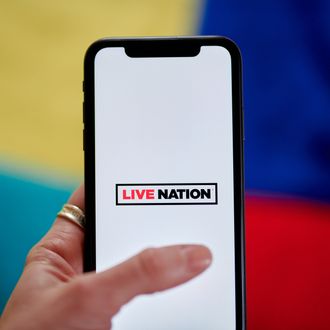
The Department of Justice claimed Live Nation and Ticketmaster’s conduct is “anticompetitive and illegal” as it announced a long-awaited antitrust lawsuit seeking to break up the companies. Attorney General Merrick Garland took Live Nation to task during a press conference after filing the suit on May 23. “We allege that Live Nation has illegally monopolized markets across the concert industry in the United States for far too long,” Garland said. “It is time to break it up.” Twenty-nine states and the District of Columbia join the Department of Justice in the suit, filed under the Sherman Antitrust Act.
Live Nation said the Justice Department’s allegations are “baseless” in a statement to media. “Calling Ticketmaster a monopoly may be a PR win for the DOJ in the short term, but it will lose in court because it ignores the basic economics of live entertainment, such as the fact that the bulk of service fees go to venues, and that competition has steadily eroded Ticketmaster’s market share and profit margin,” Live Nation claimed.
In an additional online statement, Live Nation said the Department of Justice does not understand how ticket pricing and antitrust law work, while calling monopoly allegations “absurd.” Dan Wall, the company’s executive vice-president of corporate and regulatory affairs, wrote that “the world is a better place” because Live Nation and Ticketmaster merged in 2010.
But Garland and his team laid out the alleged anti-competitive conduct of a company they said controls over 80 percent of primary ticketing, 60 percent of promotions, and 60 percent of large amphitheaters, along with having deals with over 400 artists. They dug into many oft-repeated criticisms of Live Nation and Ticketmaster, including their ticketing fees, allegedly forcing artists and venues to use their ticketing and promotion services, and buying and partnering with other promoters to discourage competition. “We allege that Live Nation controls the entertainment industry in the United States because it is breaking the law,” Garland said. He added that splitting the companies is “necessary,” while Assistant Attorney General Jonathan Kanter called for “decisive and effective solutions.” In a lighter moment of the press conference, Garland also recalled seeing a young Bruce Springsteen, who previously struggled with Ticketmaster’s dynamic pricing, open for Bonnie Raitt.
Wall refuted many of the Justice Department’s allegations in Live Nation’s statement, claiming his company does not set high ticket prices, does not charge high fees, and even lacks market power. “Ticketmaster in particular is a far better, more artist- and fan-focused business under Live Nation’s ownership than it ever was as a standalone company,” Wall said. He painted today’s lawsuit as the Department of Justice caving to outside pressure.
The antitrust lawsuit came after issues with Ticketmaster and Live Nation bubbled over in recent years, resulting in disastrous sales for tours by artists including Taylor Swift, Beyoncé, and Springsteen. Those issues also put Congress’s attention on Live Nation and Ticketmaster, with senators piling on Live Nation’s president and CFO in a hearing. The Senate introduced an antitrust bill targeting Live Nation shortly after, along with a separate bill focused on ticket fees, which just passed in the House of Representatives.
This post has been updated with an additional Live Nation statement.


